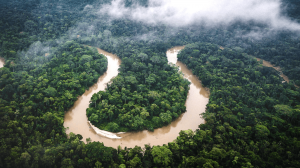
With a New Law, Ecuador Advances a Groundbreaking Model in Latin America to Strengthen Its Protected Areas System
A technical, social, and climate-focused approach marks a turning point in the country’s environmental governance
QUITO, PICHINCHA, ECUADOR, July 14, 2025 /EINPresswire.com/ -- Ecuador has passed an innovative piece of legislation that structurally transforms the management of its protected areas. The Organic Law for the Strengthening of Protected Areas establishes a robust, technical, and participatory legal framework aimed at ensuring the effective conservation of the country's strategic ecosystems, in alignment with its international environmental commitments.
Among its key provisions, the law mandates the Executive Branch to create the National Service for Protected Areas of Ecuador, a specialized public entity attached to the Ministry of Environment, Water, and Ecological Transition, with technical and financial autonomy. This new institutional model will assume certain responsibilities previously held by the Ministry, particularly the regulation of the National System of Protected Areas. It seeks to improve the planning, oversight, and sustainability of the country’s more than 70 protected areas, which cover approximately 20% of Ecuador’s continental territory and a significant portion of its marine areas—without affecting collective rights.
Key components of the law include:
Establishing a technical and financial framework for national environmental management, with the capacity to attract and manage public funds, international cooperation, and private donations.
Recognizing the collective rights of Indigenous peoples and nationalities, ensuring respect for free, prior, and informed consultation in future interventions on their territories.
Prohibiting the privatization of protected areas and limiting tourism activities to public and recreational use zones, in accordance with each area’s management plan.
Promoting the professionalization of park rangers through the development of specialized technical career tracks, reinforcing their role as key stewards of the environment.
Strengthening collaboration with local communities, environmental authorities, and international cooperation organizations.
Regional context
While several Latin American countries have institutions dedicated to conservation—such as CONANP in Mexico, ICMBio in Brazil, National Parks in Colombia, and the recently established Biodiversity Service in Chile—Ecuador’s proposal stands out for integrating three components that rarely coexist in a single entity: legal autonomy to regulate, monitor, and enforce; financial sustainability; and technical professionalization. This positions Ecuador as an emerging reference point for countries seeking to consolidate public conservation policies with long-term vision.
Voices that support this initiative
Niels Olsen, President of Ecuador’s National Assembly:
"This law is not just another legislative process; it is an act of love for the country. With this regulation, Ecuador says: never again to institutional abandonment, never again to unprotected park rangers, and never again to communities asking for help and receiving only paperwork. It is time to act with intelligence, urgency, and heart."
Daniel Noboa, President of the Republic of Ecuador:
"Ecuador is proving that environmental protection is not optional—it is an obligation. This law reaffirms our commitment to nature, to our communities, and to the planet. We hope this initiative inspires other countries to strengthen their legal frameworks for biodiversity conservation."
Yolanda Kakabadse, conservationist and Chair of the Board of the Charles Darwin Foundation:
"This law is a significant opportunity for Ecuador to reaffirm its environmental leadership. A modern, professional legal framework with clear oversight will not only support conservation but also strengthen the relationship between nature and society."
Why does this law not require prior consultation?
The creation of the National Service for Protected Areas constitutes an institutional reorganization of the State, not a territorial intervention. It does not alter land use, nor introduce new activities within protected areas, and therefore does not directly impact Indigenous peoples or ancestral communities.
However, free, prior, and informed consultation remains in full force and is mandatory for any future, concrete action that may affect collective or territorial rights, in accordance with Article 57 of Ecuador’s Constitution.
Global significance
With this law, Ecuador strengthens its role as a country committed to environmental protection. The initiative aligns with the principles of the Escazú Agreement, the Kunming-Montreal Global Biodiversity Framework, and the Sustainable Development Goals, projecting a vision of long-term responsibility, coherence, and environmental leadership.
Ecuador
Quito
email us here
Distribution channels: Environment
Legal Disclaimer:
EIN Presswire provides this news content "as is" without warranty of any kind. We do not accept any responsibility or liability for the accuracy, content, images, videos, licenses, completeness, legality, or reliability of the information contained in this article. If you have any complaints or copyright issues related to this article, kindly contact the author above.
Submit your press release
